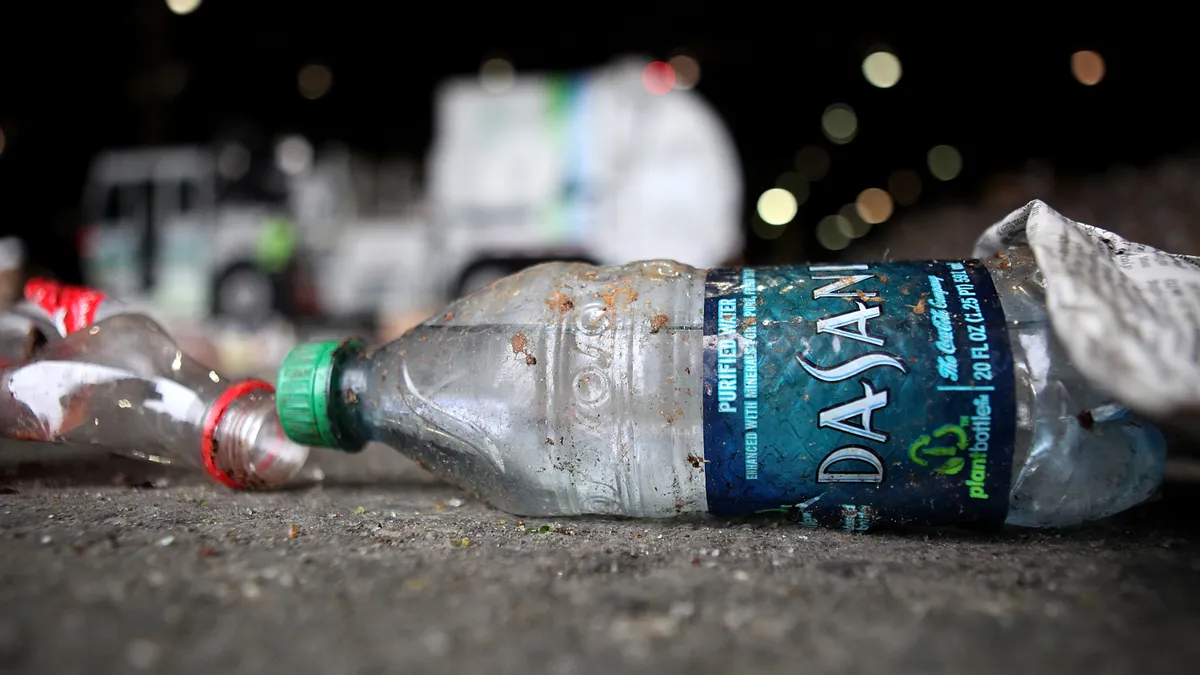Across the waste and recycling industry, changes are happening at a daily rate that are allowing vast economical and environmental improvement. A greater focus on positive goals — such as zero waste-to-landfill efforts and increased organic disposal — is keeping the industry on a path toward growth.
However some changes, like the price of recycling, are also causing shifts in the world of waste disposal — just not in a beneficial way.
Here are 10 trends that are driving the industry toward relevant and important changes:
1. CNG trucks are being widely used to cut costs and increase efficiencies
Earlier this month, Waste Management President and CEO David Steiner explained to Bloomberg Television that operating CNG (compressed natural gas) fleets makes good financial and economical sense for waste collection companies. The company now has 4,200 trucks in its fleet that run on CNG.
"Our customers want a greener solution, so it's absolutely a greener solution," Steiner said. The CNG-fueled vehicles are cleaner-burning, quieter, and also less expensive than diesel. Many companies that have switched to CNG fleets have also built filling stations in areas of service where the trucks can refuel.
Other waste collection companies — such as Republic Services and Alpine Waste & Recycling — have also made the shift, proving that CNG fleets are a force that is moving the industry forward. According to Chaz Miller of NWRA, the most rapid acceptance of CNG trucks has been in the waste industry.
- Spokane, WA adopts CNG trucks to cut costs and emissions
- Republic adds 17 CNG vehicles to Denver fleet
- New Mack truck designed for safety, comfort
2. Cities from coast to coast are implementing programs and legislation to reach zero waste goals
The concept of "zero waste" — or, not allowing any waste to reach a landfill — is a goal that is sweeping the nation, from San Francisco to New York City. By implementing new recycling programs, banning specific products, and producing more energy from waste, municipalities are able to push their communities forward in achieving the goal in the next few decades.
Initiatives to reach zero waste in NYC have allowed officials and residents in the city to "think about [waste] completely differently than we ever had before," according to Department of Sanitation Commissioner Kathryn Garcia.
SWANA and the California Resource Recovery Association (CRRA) have even announced a partnership to develop a zero waste course and certification program, allowing leaders to learn more about how to achieve the goal. If cities are able to reach zero waste-to-landfill, the environmental impact will be enormously beneficial.
- 'Zero waste' efforts extend life of San Diego landfill by 8 years
- NYC commissioner explains challenges of zero waste
- Which U.S. cities are recycling champions?
3. More landfills are seeking expansions, causing controversy between owners and residents
As population and trash production increase, local landfills are reaching capacity — causing landfill owners to scramble for a solution. Many industry leaders have been seeking landfill expansions to combat the problem, however the expansions have not been largely popular among residents and other local organizations. Issues involving odors, traffic, and location all lead to heated opposition.
If expansions are not supported, landfill owners are at risk of closing their sites and finding new ways to dispose of waste — a task that is easier said than done.
- $3M deal may allow Virginia landfill to expand, despite DEQ opposition
- Illinois county waste disposal climbs as landfill reaches capacity
- Landfills: The good, the bad, and the trashy
4. Mergers and acquisitions — especially between small companies — continue to drive businesses forward
It is no surprise that mergers and acquisitions drive the industry forward, however acquisitions among smaller waste collection companies have been a recent trend allowing the "little guys" to make a bigger impact on the industry.
While big companies, such as Waste Management, continue to make rounds of M&As throughout the year, new collection companies have proved that they're a force to be reckoned with. Companies such as Corpus Christi, TX-based K2 are paving the way for small or family-run operations to have a large growth potential in the marketplace.
- Inland Waste buys Deffenbaugh assets in AR, KS
- K2 starts waste hauling subsidiary in Corpus Christi, TX
- Action Resources acquires 2 companies
5. Municipalities are taking action to cut food and organic waste
A recent report states that a staggering 133 billion pounds of food was wasted in 2010 — a number that the United States cannot afford. The impacts of the food waste do not only affect America's people — 49 million of which are "food insecure" — but also affect the environment due to the methane that is produced by organic waste in the landfill.
In order to combat this issue, many municipalities are implementing composting programs or funding new projects (such as organic waste-to-energy plants) to ensure food waste is being disposed of properly. Some municipalities have even gone as far as banning food scraps from the landfill, which is an initiative that is widely debated in the industry.
- Safeway joins Oregon Food Bank to combat food waste
- Seattle defends ordinance despite 'trash-snooping' lawsuit
- CR&R to build new $100M anaerobic digestion plant in California
6. Bans and fees are being placed on common products — such as Styrofoam and plastic bags — to prevent them from reaching landfills
An ongoing debate regarding the recyclability of Styrofoam and plastic bags has led to many municipalities taking action against the products. Across the country, bans or fees on bags and Styrofoam — specifically in restaurants and grocery stores — have caused heated controversy.
The goal of such bans and fees is to decrease the probability that these products will reach landfills or pollute the environment. However, not everybody agrees with the various legislation being put in place. In New York City, hundreds of restaurants are petitioning a ban on Styrofoam, demanding for a reversal of the legislation — which will not happen, Commissioner Garcia told Waste Dive. Additionally, Honolulu replaced plastic bags with "reusable bags" that some claim are even worse for the environment.
Officials across the industry will need to try to see eye-to-eye on these issues in order to implement better solutions that are beneficial to both the consumer and the environment.
- Cleaning up consumer behavior with plastic bag fees
- To ban or recycle? Inside the foam fight dividing the industry
- Pilot program aims to divert plastic bags, eliminate clogged machinery
7. The concept of waste-to-energy is growing as more companies find ways to turn refuse into reusable products
Companies are beginning to find new and innovative ways to produce renewable energy from municipal solid waste and landfill gas, which is truly pushing the industry toward a more sustainable future. By building waste-to-energy plants, focusing on alternative WTE methods, and testing various technologies, the waste industry is on track to a making a greener footprint on the environment.
Additionally, waste-to-energy efforts have been saving companies money that they would likely spend on other fuel sources. A report regarding gasification of MSW stated, "Instead of paying to dispose of and manage waste for years in a landfill, using it as a feedstock for gasification reduces disposal costs and landfill space, and converts those wastes to electricity and fuels."
- Gasification of MSW may save Mother Earth
- Green3Power completes deal for Florida waste-to-energy plant
- Pelatron Q plans to build WTE plant in Kauai, HI
8. Interstate waste transportation is becoming a burden for some states
Importing and exporting solid waste and recyclables is a practice that has been done for many years, however the industry is at a tipping point regarding interstate waste transportation. Recently, Pennsylvania Senator Bob Casey introduced the Trash Reduction and Sensible Handling (TRASH) Act of 2015 to restrict the flow of out-of state waste into Pennsylvania — and pave the way for other states to do the same.
The mode at which waste is transported from state-to-state is also changing, with many cities switching to rail service in order to decrease the cost of truck transportation. The exchange of solid waste may be completely transformed in the coming years, which is a trend that industry leaders need to be sure to monitor closely.
- Sen. Casey: 'Pennyslvania shouldn't be a dumping ground'
- Kentucky's Big Run landfill will stop taking out-of-state trash by rail
- New transportation deal drops NYC trash in Delaware before Pennsylvania
9. Low levels of commodity recycling are leading to changes in municipal recycling programs
The cost of disposing recyclable materials — especially glass — is taking a toll on companies in the industry. In some cities like Chattanooga, recyclables are going to a landfill because MRFs are not equipped to handle glass. In other cities, the cost of throwing recyclables in the landfill is simply less expensive than recycling. Therefore, many municipalities are implementing citywide recycling programs to combat this issue.
By asking consumers to pay a recycling fee, some municipalities are able to combat cost issues and keep recycling a profitable business. Additionally, many organizations are making efforts to combat sorting confusions among consumers. Recycle Across America, NWRA, and Keep America Beautiful are all rolling out new initiatives to promote more recycling and ensure it is being done properly — which will save the industry money in the end.
- Oregon bottle deposit likely to double in 2017
- Indiana county may cut recycling sites due to lack of funding
- Proposed recycling fee in Fort Collins, CO will not move forward
10. Companies are creating more innovative and advanced trash and recycling containers
From trash cans that can tweet their capacity to cans that are bear-proof, companies are more innovative than ever when designing waste and recycling bins. The technology offered in many of the new bins has allowed the industry to increase efficiency and decrease energy-use, which is crucial for the way the industry is shifting.
Trash cans are also becoming more available for some consumers — such as residents in Baltimore or students at Stanford University — as officials try to ensure that everybody has equal opportunity for waste disposal with access to appropriate containers.










